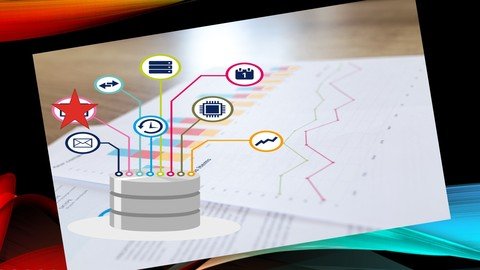Oracle Sql For Data Analytics And Data Warehousing Overview
- 11.11.2022
- 21

Last updated 11/2019
MP4 | Video: h264, 1280x720 | Audio: AAC, 44.1 KHz
Language: English | Size: 3.15 GB | Duration: 4h 31m
Learn about enhanced functions of Oracle SQL for Data analytics and get an overview about Data warehousing
What you'll learn
Oracle SQL - Extensively about select statement (DML) from Data analytics point of view
An overview about Data warehousing concepts.
Understanding about other sql statement like DDL, DMLs
Basic understanding of ER diagrams, Oracle Instance and Database
Requirements
Some programming background would be beneficial
For optimum results use headphone speaker
Does not require any installs on your laptop/ PC
Description
Enterprise worldwide has huge data on their business application be it in the from of ERP or Data warehousing information. The heart of these system are Relational data base and enterprise world over are looking for expert who can derive meaningful information from the system, so as to grow and drive the business.An Oracle SQL expert from data analytics perspective is always on high demand. Considering this, the course is packed with all the necessary details.Apart from regular sql 'select statement ' which is called DML statement it also covers business analytics statement such as:Roll Up group.Cube - commonly referred in Data warehousing towards multi-dimensional data analyticsHierarchical functions.Additionally it also has an overview about Data warehousing concepts, which provides you with basic knowledge, which can then be used to acquire Datawarehouse - ETL tools and OLAP tools knowledge.One can learn Oracle SQL without any install through Cloud Oracle DB along with data set for easier practice.Happy Learning!!
Overview
Section 1: Introduction
Lecture 1 Course Overview - Topics of coverage
Section 2: Whats a business application?
Lecture 2 What is business application
Lecture 3 Difference between OLTP and OLAP
Section 3: Relational Database and SQL
Lecture 4 What is Relational Database?
Lecture 5 Business flows, ER diagrams and RDBMS
Lecture 6 Structured Query Language - Introduction
Lecture 7 ER Diagram - Tables commonly used in this course
Section 4: What is an Oracle Instance?
Lecture 8 What is an Oracle Instance?
Section 5: Quiz 1
Section 6: Difference environment to practice Oracle SQL
Lecture 9 Difference environment to practice Oracle SQL
Lecture 10 Oracle Apex SQL environment and dataset for learning
Section 7: Oracle SQL : Select statement - Arithmetic, Concatenate, Distinct functions
Lecture 11 Select statement - Arithmetic, Concatenate, Distinct functions
Lecture 12 Select Statement - Demonstration - Arithmetic, Concatenate, Distinct function
Section 8: Oracle SQL: Select Statement - Filtering data - using where clause
Lecture 13 Oracle SQL: Select Statement - Filtering data - using where clause
Lecture 14 Demonstration Select Statement - Filtering data - using where clause
Section 9: Oracle SQL: Select statement - Functions
Lecture 15 Oracle SQL: Select statement - Functions 1
Lecture 16 Oracle SQL: Select statement - Demonstration - Functions
Lecture 17 Oracle SQL: Select statement - Functions 2 - Nested, Case,Decode
Section 10: Quiz 2
Section 11: Analytics function used in Data warehousing / Business Intelligence
Lecture 18 Analytics functions - Min, Max, Avg, Nvl, Std dev
Lecture 19 Analytics functions - Demonstration - Min, Max, Avg, Nvl, Std dev
Lecture 20 Analytics functions - Group By and having clause
Lecture 21 Analytics functions - Demonstration - Group by and having clause
Lecture 22 Analytics functions - Rollup and Cube functions
Lecture 23 Analytics function - Demonstration - Rollup and Cube functions
Lecture 24 Analytics Function - Select statement - Hierarchical
Lecture 25 Analytics Functions - Select Statement - Demonstration - Hierarchical
Section 12: Oracle SQL : Retrieving Data from multiple tables - JOINS
Lecture 26 Different Types of Joins - Natural and equi joins
Lecture 27 Demonstration 1 - Natural and equi joins
Lecture 28 Demonstration 2 - Natural and Equi Joins
Lecture 29 Joining table to itself towards data retrieval - Self Joins
Lecture 30 Demonstration - Self Joins
Lecture 31 Outer Joins between tables
Lecture 32 Demonstration - Outer joins between tables
Lecture 33 Oracle SQL: What is subquery
Lecture 34 Demonstration - Subquery
Lecture 35 Other DMLs
Section 13: Quiz 3
Section 14: Data Definition Language
Lecture 36 Data Definition Language
Lecture 37 Demonstration - Data definition Language
Section 15: DB - Schema, Synonym, Sequence, Index - Overview
Lecture 38 DB - Schema, Synonym, Sequence, Index - Overview
Section 16: Do's, Don't and Tuning Sql - Overview
Lecture 39 Do's, Don't and Tuning Sql - Overview
Section 17: What is Data Dictionary?
Lecture 40 What is Data Dictionary?
Section 18: Quiz 4
Section 19: DataWarehouse and Business Intelligence : An overview
Lecture 41 DataWarehouse and Business intelligence
Lecture 42 Dimension models
Lecture 43 DWH Schema - Star and Snowflake schema
Lecture 44 Fact and Dimension table
Section 20: Quiz 5
Section 21: Bonus Lecture: Concluding remarks & Next steps
Lecture 45 Bonus Lecture: Concluding remarks & Next steps
Beginner interested to get into the most sought and on-demand career in Data analytics using Oracle SQL,Student who wish to enter into the career as Oracle Developer (analytics) and get an understanding on Data warehousing / analytics
Homepage
https://www.udemy.com/course/oracle-sql-for-data-analytics-and-data-warehousing-overview/Download ( Rapidgator )
DOWNLOAD FROM RAPIDGATOR.NET
DOWNLOAD FROM RAPIDGATOR.NET
DOWNLOAD FROM RAPIDGATOR.NET
DOWNLOAD FROM RAPIDGATOR.NET
Download (Uploadgig)
DOWNLOAD FROM UPLOADGIG.COM
DOWNLOAD FROM UPLOADGIG.COM
DOWNLOAD FROM UPLOADGIG.COM
DOWNLOAD FROM UPLOADGIG.COM
Download ( NitroFlare )
DOWNLOAD FROM NITROFLARE.COM
DOWNLOAD FROM NITROFLARE.COM
DOWNLOAD FROM NITROFLARE.COM
DOWNLOAD FROM NITROFLARE.COM
Please Help Me Click Connect Icon Below Here and Share News to Social Network | Thanks you !